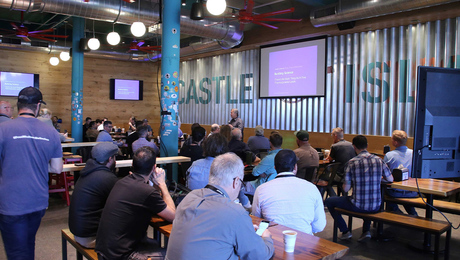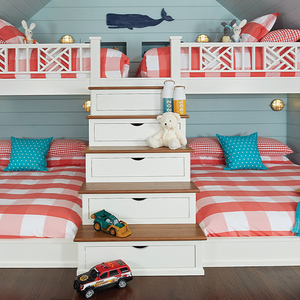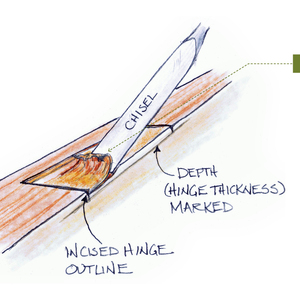*
Hey guys,
While I’m still leaning towards a ICF basement (amidst all the termite concerns)for my new house, I’m also still trying to gather as much info as I can about a block and a poured wall basement. Let’s start with a concrete block basement.
When I think of a concrete block basement, I see stair step cracks and moisture……..Only because of the houses I’ve either lived in or have visited. Also, a friend’s recent new built house was done in block and there were several cracks (daylight!) a week later. Now, I understand the wall’s only going to be as good as the footer, right? But, I plan to use my basement as living space, and insulation and waterproof-ness are important to me. Therefore, can you foundation experts give me some insight on concrete block basements? I’m willing to consider it, but I just have a negative image of them. Thanks.
Matt



















Replies
*
We live in MN and have clay soil. When we built we were given a choice by the builder as to poured or block. We talked to a few concrete people who assured us there was ultimately no difference in strength or longevity. We were skeptical however, and opted for poured walls, and nine years later with no cracks or shifting we're glad we chose it. The only downside may be that because there are no air pockets, the walls can be somewhat colder than block, but frame and insulate and you're O.K.
*
Matt, in my OPINION poured walls are the way to go. The majority of block walls I've come acrossed have had a stepped crack in it. The price between block and poured are fairly close together. I live in northern MN and block just doesn't stay together. Hope this helps a little and good luck with your project.
*
Concrete block walls/basements can be just as stong as cast-in-place concrete. the key is to build them properly. that requires both vertical and horizontal re-bar (just as in poured concrete) and filling many of the cells with concrete. it also requires a good footing. concrete inherently has a slightly stronger flooting if the floor and walls are tied together with steel. The stairstep cracks have two causes: a footing that has settled (differential settlement) and/or lack of reinforcing steel in the block wall. With either construction, always add good drainage details
*
I agree with all the above, special note to figuers.
If the concrete block is tied to the footer with re-bar, and the re-bar ties all the blocks together, and then all the cells are pumped with concrete, then concrete block is good. In this way, the blocking itself also acts as the forms one would create/install for poured walls.
But if you use the concrete block, I am pretty sure that the outside will have to be parged. This is a lot of work to keep further moisture out. Especially since one might feel that the work is done already, once the wall is up.
Also, even with all the cells filled, the block and concrete may not completely adhere, in places you cannot see. These are places were problems could develope. Water could get in a freeze, etc...
And, the thickness of a 12" poured wall is 12" of very strong concrete. The thickness of a block wall seems to be 12", but is weaker on the outsides, than the center.
All in all, I think that block is just too risky, over the long term. Just too many pieces, and too many places where those pieces vitally need proper connection.
I would go with poured. Then you know you are done, when you are done.
Hope this helps.
*Alan, et al. the exterior of the CMB wall must be parged becsause the pores in the CM<bs are to large for conventional dampproofing. after the parging coat is applied it too must be dampproofed with, preferbly and emulsion typa asphalt compound.The cost of a cast-in-place--poured- concrete foundation can be lowered by, for example, using an 8-inch wall rather than a 10-inch wall. And evnen using a 6-inch wall rather than an 8-inch wall. This is allowed by code depending on height on unsupported backfill. GeneL.
*
If you are planning to use your basement area for living space you will far ahead (financial and quality wise) by using ICF's. There are alot of good systems out there that vary in costs. Where are you located? I sure I could direct you to some one in your area. Blue Maxx has come out with a study that shows that ICF's and termites when they come together does not mean the end of the world as we know it, as I've read in this forum before.
Termites need water food and a place to live. ICF's do not provide all three of these items. With termite shields, as used with other systems, they can be controlled very nicely when onlyused as a foundation and not the entire house.
Checkout: http://www.insulatingconcreteform.com
good luck with your project
Rob Dykeman
*In this area of the northwest any basement could be a problem. Leakage has a lot to do with location, drainage, foundation drains, backfill choice and waterproofing.Our bids are a little higher then some of our friends because we do not skimp any on these factors. It is really one of those places that doing it now is a whole lot cheeper then later. If we are locating on a hillside we will even try to put in a french drain further up hill. When we go out to look at a leak in a basement of an older home it is often related to one of the above in combination with cracks in a wall. Obviously block walls have more potential to crack. If we did a block wall I would fill all the cells, but we dont do block under ground with the exception of( at owners request ) a stem wall and we are using decorative splitface.I have also seen more block walls lean in or bend with age from backfill or tree roots, but these have been hollow celles. Poured walls would be better then block and leaks seem to be in areas of cold seams. However all termite concerns aside we will always try to use ICF's. Fast, easy to work with, lower cost and because of the insulated form the concrete actually cures slower and is therefore stronger. But whatever system you pick it all hinges on three things, 1) good engineering 2) quality workmanship 3) the second scentence above(waterproofing).Contact me if I can help. Josh at silverhammer_@hotmail.com
*
Hey guys,
While I'm still leaning towards a ICF basement (amidst all the termite concerns)for my new house, I'm also still trying to gather as much info as I can about a block and a poured wall basement. Let's start with a concrete block basement.
When I think of a concrete block basement, I see stair step cracks and moisture........Only because of the houses I've either lived in or have visited. Also, a friend's recent new built house was done in block and there were several cracks (daylight!) a week later. Now, I understand the wall's only going to be as good as the footer, right? But, I plan to use my basement as living space, and insulation and waterproof-ness are important to me. Therefore, can you foundation experts give me some insight on concrete block basements? I'm willing to consider it, but I just have a negative image of them. Thanks.
Matt